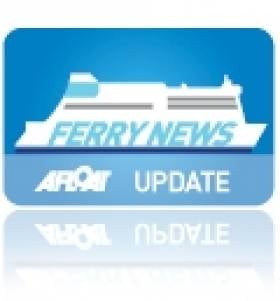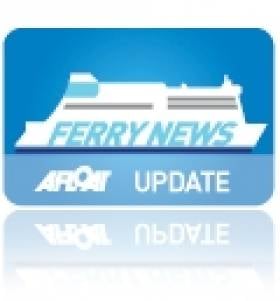Displaying items by tag: High Speed Service
Bon Voyage to Stena Voyager
The Stena Voyager high-speed ferry will make its final crossing between Belfast and Stranraer in mid-November.
BBC News cites the high cost of running the service, as well as its limited freight capacity, as reasons for the mothballing of the Stena HSS (High Speed Service).
The world's biggest high-speed ferry was a revelation when it was launched in 1996. The catamaran could reach speeds of up to 40 knots powered by enormous gas turbine engines.
But the rising cost of oil prompted a reduction in the ferry's cruising speed to save costs, making room for competition from conventional ferry routes with larger freight capacities.
The Voyager's fate was sealed when Stena Line announced plans to move its Stranraer port to a new location that will shave 20 minutes off the crossing for the two new but standard ferries that will replace it.
As previously reported on Afloat.ie, the Stena HSS between Dun Laoghaire and Holyhead will also be suspended from later this month, though it is planned to resume service in 2012 for the summer season.
Stena to Re-Introduce HSS this Week
Stena Line's HSS fast-ferry the Stena Explorer will be re-introduced on its Dun Laoghaire to Holyhead route this Friday, writes Jehan Ashmore.
The HSS (High Speed Service) operated 19,638 tonnes craft will run between 1 April to 13 September to cope with the additional demand over the summer period.
A single daily round trip is scheduled with a 10.00 hours sailing from Holyhead and a 13.15 hours sailing from Dun Laoghaire. Passage time is 120 minutes (2 hours).
The HSS can 350 vehicles and with 1500 passengers, the craft can handle higher volumes of seasonal summer foot passengers compared to the last route serving vessel, the 4,113 tonnes Stena Lynx III. The return of the HSS service links in with those intending to make onward journeys from Dun Laoghaire's DART commuter rail service to Dublin city centre and beyond on the national rail network.
Up to early January the route had been served by the Stena Lynx III which remains moored alongside Dun Laoghaire's St. Michaels Wharf. The craft which can take 627 passengers and 120 cars and marketed as the Stena 'Express' is to resume high season sailings starting in July between Rosslare-Fishguard.
In total the company carries over two million passengers on its four Irish Sea routes each year. An additional route between Belfast-Liverpool (Birkenhead) was taken over by the Swedish owned ferry company from DFDS Seaways late last year, is subject to regulatory clearance.
Until such clearance has been granted, this route will be operated separately from all other Stena Line routes. In the meantime the company advise until further notice to make bookings which will remain acceptable through the use of the DFDS website.
































































